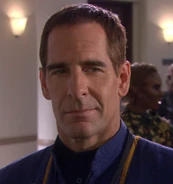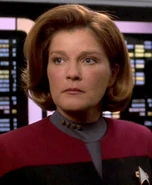No edit summary |
(→Earth history: + info) |
||
| Line 39: | Line 39: | ||
On [[Earth]], the title of captain was used as far back as the Middle Ages, where a captain was a nobleman commissioned to command a company of soldiers. One of the characters of [[William Shakespeare]]'s play ''[[Henry V]]'' was quoted as saying "''Under what captain serve you?''" when approached on guard duty. ({{TNG|The Defector}}) |
On [[Earth]], the title of captain was used as far back as the Middle Ages, where a captain was a nobleman commissioned to command a company of soldiers. One of the characters of [[William Shakespeare]]'s play ''[[Henry V]]'' was quoted as saying "''Under what captain serve you?''" when approached on guard duty. ({{TNG|The Defector}}) |
||
| − | By the [[20th century]], the rank of captain was common in Earth militaries and was used by all branches of service in the [[United States armed forces]]. The rank of captain was represented by a double rectangular silver bar uniform insignia for ground units and the equivalent of a [[colonel]]'s eagle for naval captains. In [[2364]], the [[Q]]-entity took the form of a [[US Marine Corps]] captain when confronting Captain [[Jean-Luc Picard|Picard]]. In this disguise, Q was quoted as stating "''All it takes is a few good men''." ({{TNG|Encounter at Farpoint}}) |
+ | By the [[20th century]], the rank of captain was common in Earth militaries and was used by all branches of service in the [[United States armed forces]]. The rank of captain was represented by a double rectangular silver bar uniform insignia for ground units and the equivalent of a [[colonel]]'s eagle for naval captains. In [[2364]], the [[Q]]-entity took the form of a [[US Marine Corps]] captain when confronting Captain [[Jean-Luc Picard|Picard]]. In this disguise, Q was quoted as stating "''All it takes is a few good men''." Q also appeared as a [[16th century]] [[sea]] captain to the crew. ({{TNG|Encounter at Farpoint}}) |
The rank of captain was also used by [[World War II]] [[Germany]]. In the German army, the rank was translated as ''Hauptmann'' (headman), but in the [[SS]], company captains were referred to as ''Hauptsturmführer'' ("head storm leader"). The collar insignia for this was a black square bordered with white, with three silver [[pip]]s in a diagonal line, with two stripes underneath. |
The rank of captain was also used by [[World War II]] [[Germany]]. In the German army, the rank was translated as ''Hauptmann'' (headman), but in the [[SS]], company captains were referred to as ''Hauptsturmführer'' ("head storm leader"). The collar insignia for this was a black square bordered with white, with three silver [[pip]]s in a diagonal line, with two stripes underneath. |
||
Revision as of 22:37, 22 November 2012
AT: "xx" Captain is a military rank, the equivalent of which is used by the service organizations of many civilizations. The title of captain is often used by vessel commanders and, as a naval rank, in many Earth navies and Starfleet, is above commander. As an infantry rank, captains rank subordinate to a major and above a first lieutenant. The abbreviation for captain is capt.
Earth history
On Earth, the title of captain was used as far back as the Middle Ages, where a captain was a nobleman commissioned to command a company of soldiers. One of the characters of William Shakespeare's play Henry V was quoted as saying "Under what captain serve you?" when approached on guard duty. (TNG: "The Defector")
By the 20th century, the rank of captain was common in Earth militaries and was used by all branches of service in the United States armed forces. The rank of captain was represented by a double rectangular silver bar uniform insignia for ground units and the equivalent of a colonel's eagle for naval captains. In 2364, the Q-entity took the form of a US Marine Corps captain when confronting Captain Picard. In this disguise, Q was quoted as stating "All it takes is a few good men." Q also appeared as a 16th century sea captain to the crew. (TNG: "Encounter at Farpoint")
The rank of captain was also used by World War II Germany. In the German army, the rank was translated as Hauptmann (headman), but in the SS, company captains were referred to as Hauptsturmführer ("head storm leader"). The collar insignia for this was a black square bordered with white, with three silver pips in a diagonal line, with two stripes underneath.
In a holodeck simulation of a Nazi campaign in France, a group of Hirogen pitted the crew of USS Voyager against holographic 1940s Germans. A US Army captain named Miller was the role assigned to Chakotay in the program; an SS Hauptsturmführer captain was another character in the simulation. (VOY: "The Killing Game", "The Killing Game, Part II")
Starfleet captains
By the mid 22nd century, captain was a senior line officer rank of most space services and usually given to the commanding officers of starships. This naval rank is equivalent to the infantry rank of colonel, the Romulan Star Empire's commander grade, the Cardassian Union's title of gul and the Ferengi Alliance's quasi-military DaiMon title.
On starships, the term captain is also often used as a synonym to commanding officer. Proper naval parlance says that, even if a vessel is commanded by an officer whose rank is lower than captain, that officer is still able to be referred to as a captain while on the deck of their own vessel, no matter their literal commissioned rank.
Captains of starships, often located hundreds of light years away from and out of communications with higher authority, must be able to function autonomously and make independent command decisions affecting Federation policy and countless lives. Accordingly, few Starfleet officers ever gain the captaincy of a starship, the result of decades of sustained excellence as a Starfleet leader.
A senior captain given a large degree of responsibility or administrative assignment is sometimes given the title of fleet captain.
The rank of captain may also be held by non-command personnel, especially on ships with a number of veteran and senior officers whose experience has warranted advancement to the rank of captain but without command of a starship. Such was the case on the USS Enterprise-A, where the senior staff consisted of no less than three captains: the commanding officer (James T. Kirk), the first officer (Spock), and the chief engineer (Montgomery Scott). (Star Trek VI: The Undiscovered Country) Captain Scott had previously held his rank of captain while chief engineer of the USS Excelsior, where he was known as the "captain of engineering". (Star Trek III: The Search for Spock)
The rank of captain may also be held by staff officers, such as those assigned to as a Judge Advocate General sector officer. Such was the case with Phillipa Louvois, who was a sector JAG officer in 2365. (TNG: "The Measure Of A Man") Reaching the rank of captain in other non-command branches of Starfleet is generally considered difficult, as noticed by one security officer, who once remarked "You don't make captain by wearing a gold shirt". (DS9: "The Adversary") However, the rank is apparently obtainable in both the sciences and operations division, as the rank was held by Captain Krasnovsky in 2267, although he may have held command qualification while also being a science officer, and Vice Admiral Toddman presumably held the rank sometime before 2371. (TOS: "Court Martial"; DS9: "The Die is Cast")
Some noted captains in Starfleet history were:
- Captain Jonathan Archer of Enterprise NX-01
- Captain Christopher Pike of the USS Enterprise
- Captain James T. Kirk of the USS Enterprise and USS Enterprise-A)
- Captain Jean-Luc Picard of the USS Enterprise-D) and the USS Enterprise-E)
- Captain Benjamin Sisko of Deep Space 9 and the USS Defiant
- Captain Kathryn Janeway of the USS Voyager
The Starfleet of the alternate reality established in 2233 by the temporal incursion of the Romulan Nero had the following noteworthy captains:
- Captain Christopher Pike of the USS Enterprise
- Captain James T. Kirk of the USS Enterprise
Other versions of captain
Captain is a title typically held by commanders of merchant vessels and sometimes service craft. In 2367, Wesley Crusher remarked in a bemused manner that Dirgo was claiming to hold the rank of captain while serving as the master of the mining shuttle Nenebek. To this, Dirgo sternly told Crusher that yes, indeed, his rank was that of captain in comparison to Crusher's rank of ensign. (TNG: "Final Mission")
The title of captain was also given to the leader of a sports team. Julian Bashir was the captain of the Starfleet Medical Academy racquetball team. (DS9: "Rivals")
| Enlisted personnel | Commissioned officers | Flag officers | ||||||||||||||||||
|---|---|---|---|---|---|---|---|---|---|---|---|---|---|---|---|---|---|---|---|---|
| Fleet: | CRM | PO | CPO | MID CDT OC WO |
ENS | LT JG | LT | LT CMDR | CMDR | CAPT | FCAPT | CDORE | RADM | VADM | ADM | FADM | ||||
| Military: | PVT AMN |
CPL LCP |
SGT | SSGT | MSGT 1SGT |
2nd LT | 1st LT | CAPT | MAJ | LT COL | COL | BRIG | MAJ GEN | LT GEN | GEN | MARSHAL | ||||
| Services: | Andorian • Bajoran • Cardassian • Ferengi • Human (CSA • Third Reich • UE MACO • USA) • Jem'Hadar • Klingon • Romulan • United Earth/Federation Starfleet • Vulcan Mirror universe: Terran Empire Starfleet • Terran Empire MACO | |||||||||||||||||||
Appendices
Related topics
Background information
The Bajoran Militia, which also used army rank names, has been referred to by the Star Trek Encyclopedia as having a captain grade, with an insignia seen in episodes on officers subordinate to Major Kira Nerys, although they were never referred to by any specific rank in canon productions or materials.




